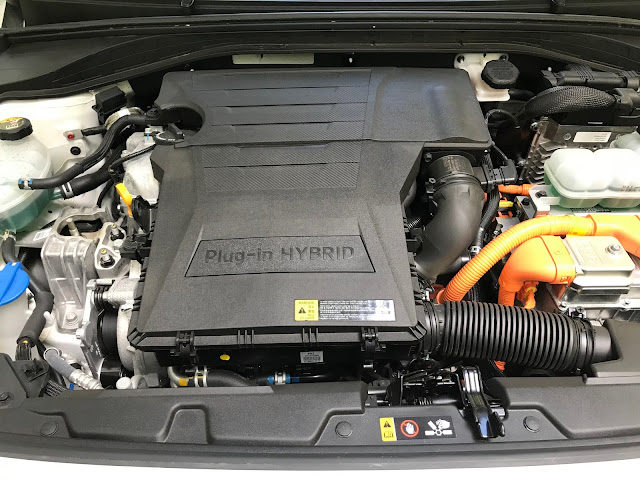 |
| 2019 Hyundai Ioniq Plug-In Hybrid. |
Look around you in traffic. It may be a bit different where you live, but here in Northern California, I guarantee you that you can hold your breath
until you see an electric car and pretty much not interrupt normal
breathing.
Yes, being an area full of
highly-educated people, early adopters and where they
make Teslas stacks the odds a bit, but even on our nine-day camping trip that took us through remote areas of Utah and Colorado, not a day went by that I didn't see a Tesla Model S or Model 3, a Nissan Leaf or a Chevy Bolt.
But what if you’re not quite ready to take the all-electric
plunge? A plug-in hybrid is a great way
to go---in fact, I think PHEVs are the underappreciated gateway to electric
mobility for the majority of Americans.
 |
| 2019 Hyundai Ioniq Plug-In Hybrid. |
Let’s take the 2019 Hyundai Ioniq Plug-In Hybrid as an
example. It’s a gasoline-electric hybrid
(think Toyota Prius) that splits the propulsion chores between a gasoline
engine and an electric motor. Sometimes
it’s one, sometimes it’s the other and sometimes, it’s a blend. The computer figures out which is right and
most efficient for the conditions and makes it so. It gets great mileage just as a hybrid---an
EPA-estimated 52 miles per gallon combined city/highway, which is exactly what
I saw driving a roundtrip between the San Francisco Peninsula and TireKicker World Headquaters in Folsom (suburban Sacramento).
 |
| 2019 Hyundai Ioniq Plug-In Hybrid powerplant. |
But---the plug-in part is where things get very cool. The Ioniq PHEV gets 29 miles from a
charge. So if you live 14.5 miles or
less from work, you can do your commute without using a drop of gas or putting
a particle of pollution in the air, charge it overnight and do the exact same
thing over and over and over. If you
have charging at work, your commute could be 58 miles roundtrip and---no gas,
no pollution.
And if you need to go farther, that's when the gasoline/electric hybrid kicks in, allowing you to drive almost 600 miles before refueling.
Having just done 250+ miles in the Ioniq PHEV a few hours
before writing this, I can tell you that it’s comfortable, roomy, composed and
well-equipped. The base price is $29,350
and that buys a lot of standard equipment:
· Anti-lock brakes with electronic brakeforce distribution and brake assist.
· Four-wheel disc brakes with integrated regenerative braking (building back up the charge)
· Automatic emergency braking and lane-keep assist.
· Blind-spot detection with rear cross-traffic alert and lane change assist.
· Rearview camera.
· 16-inch Eco-spoke alloy wheels.
· LED headlights, taillights and daytime running lights.
· Proximity key with pushbutton start.
· Smart cruise control (keeps a set distance between you and the car you’re following).
· Leather seating surfaces with heated front seats and power driver’s seat.
· Leather-wrapped tilt and telescope steering wheel with paddle shifters.
· Auto-dimming rearview mirror with compass and HomeLink.
· Seven-inch color touchscreen audio display
· AM/FM/HDRadio audio system with Apple CarPlay and Android Auto.
· 90-day trial subscription to SiriusXM Satellite Radio.
· Emergency tire puncture repair kit.
Which makes for a complete enough vehicle that you could buy
one for $650 shy of $30,000 and be quite happy.
 |
| 2019 Hyundai Ioniq Plug-In Hybrid interior. |
Our tester, in fact, had only two options---carpeted floor mats for $125
and the Ultimate Package (power tilt-and-slid sunroof, HID headlights with
dynamic bending light function, rear parking sensors, integrated memory system
for driver’s seat, navigation, an upgraded Infinity Premium Audio system with
Harman Kardon’s Clari-Fi technology, which restores missing data from
compressed audio sources like mp3s, and Qi wireless charging) for $2,975.
That brought the bottom line, with $885 inland freight and
handling, to $33,335---a very reasonable price for any car these days---and
especially one with this level of equipment.
Again, if you’re feeling like you could do more for our
environment, but your lifestyle isn’t quite pure-electric ready, PHEVs in
general and the Hyundai Ioniq Plug-In Hybrid in particular are a great start.